The 2024 Time-Based Art Festival Revives the Party

Image: Angel Origgi/Courtesy PICA
In 2012, choreographer Keith Hennessy brought a show called Turbulence to Portland’s Time-Based Art Festival. Naked dancers ate doughnuts, audience members stacked themselves into human pyramids, and, at one point, performers spread the contents of a few viewers’ wallets along their floor-bound bodies like a distasteful sushi display. The piece was, you see, about the economy. Two years later, conceptual artist Luke George cloaked his audience like bedsheet ghosts for a “fake ritual”: monologues, fits of grace, lots of touching strangers. Maybe it was about seeing how far they would go.
Since 2003, the Portland Institute for Contemporary Art (PICA) has made what seems a solemn promise of refusing to squarely define what organizes its annual extravaganza, spread this year across three weekends in September. Time is the operative word. The art is durational. Otherwise the festival is an impressively elastic container for—anything, really.
If this installment of TBA has a theme, it’s resurrecting at least some of the buzzy, party energy that’s escaped the festival in recent years, amid pandemic-era virtual pivots and 2023’s “time-released” iteration, which staggered shows over months. Now, TBA is what PICA’s visual art curator Kristan Kennedy calls a “human-sized” festival: raucous like the early days, joyously chaotic, but pushing the artists and audience only so far (there’s history of stamina-testing acts and schedules). Programming includes a party-as-performance art project pulled over from Kelly’s Olympian as well as a show that transforms PICA’s warehouse space into a bar. “These events are parties, but they are done in a way that’s like a moving, living artwork,” Kennedy says. “What does a community look like when they become a total artwork together?”

Image: Bronwen Sharp/Courtesy PICA
The schedule is busy but manageable, Kennedy says, to allow dialogue between artists, performances, and audiences. “Germinating ideas need to bump up against each other,” adds performance curator Erin Boberg Doughton.
A jam session of sorts in front of the Pacific Northwest College of Art officially kicks things off September 5, taking place amid the flurry of first Thursday openings in the Pearl District. Open to all—Boberg Doughton encourages people to “show up with an instrument or their bodies or voices”—the jam is hosted by digital media collective Videotones, a group of neurodiverse artists who make affecting and often funny video and music recordings using the likes of outmoded digital camcorders. Recordings from the jam will filter into Videotones’s survey show, Outside Inside World, at the school’s 511 Gallery.
Videotones is “sort of eternally in residence at PICA,” Boberg Doughton says. Other festival acts are similarly homegrown, produced by current and recent PICA artists in residence. “Curating humans” is how Kennedy and Boberg Doughton describe their approach, a phrase and philosophy they’ve held onto since hearing it at a panel years ago. “Some curators are curating objects, or maybe even performances or exhibitions,” Kennedy says. “We really are curating people.”
Among those people this year is Anna Martine Whitehead, who’s spent the past five years in conversation with PICA creating an opera called FORCE! (September 6 & 7). The three-act piece, which blends musical genres, dance, and spoken word, frames itself as a critical look at audiences’ fascination with art produced in prisons. Another is New Yorker Autumn Knight, a 2022 Guggenheim Fellow and recent PICA artist-in-residence, whose NOTHING#15, a bar (September 19–21) will makeover PICA’s warehouse as a club for an immersive installation that conflates the performer-audience relationship with that of staff and customer.
Of course there are also a few TBA alums. Performer Morgan Bassichis’s Can I Be Frank? (September 6–8) is a pastiche of the 1987 show Frank Maya Talks, among the first to feature an out gay comedian on network television. Part lecture, part podcast, and part play, the Javaad Alipoor Company’s Things Hidden Since the Foundation of the World (September 20 & 21) takes the unsolved 1992 murder of Iranian pop star Fereydoun Farrokhzad as its subject, interrogating modern media literacy along the way.

Image: Anne Tetzlaff/Courtesy PICA
Not all artists are so embedded with PICA though. There’s room for exciting acts to drop in for a performance or three, often pushing their acts past the limitations of other venues when they do. Malik Nashad Sharpe, who performs as Marikiscrycrycry, brings Goner (September 12 & 13), a multimedia dance piece the Guardian called a sexualized “horror show with shades of Squid Game and Blair Witch.” The musician, writer, and 2024 Whitney Biennial participating artist JJJJJerome Ellis, who spells their name with five Js because it’s the word that trips their stutter most frequently, will perform Aster of Ceremonies (September 14) just once, “a devotional song cycle attending to eighteenth- and nineteenth-century Black runaway slaves who stuttered.”
And about those parties? Well, a tea party first. A kite-making workshop with food, drink, film screenings, and a concert from Portland band Seffarine make up Teta’s Tea (September 15), a fundraising event for families from Gaza hosted by Flowers for Palestine. For the later-night crowd, Portland performance artist Kye Alive’s experimental queer talk show, Club Alive (September 7), which comes complete with its own “bizarro house band,” trades its usual Kelly’s Olympian spot for PICA’s warehouse. And drag clown Carla Rossi brings her much-loved Queer Horror series (September 13) over from its standing gig at the Hollywood Theatre (“Access notes: Potential strobing, death and destruction”).
In true TBA fashion, Boberg Doughton says, “We’ll see how late people want to go.”
TBA 2024 runs September 5–22; see PICA’s website for tickets and the full schedule.




